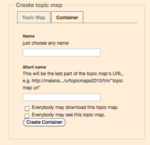
Maiana-Hatana release
Published by {{by}} on {{at}} and updated at {{updated}}.
Abstract:
Maiana, the Lab’s Topic Map browser, was presented at Topic Maps 2010 in Oslo last week. Simultaneously we released a new version of the portal including two new key features: 1. users may now validate their topic maps against a topic map schema and 2. one may now create a virtual container to merge public maps - own and shared ones - and produce a read-only merged view on all maps in the container.
Again, the Topic Maps Lab is proud to announce a new release of ! We call it the Maiana-Hatana version: Hatana is the name of the Lab’s virtual merging engine and enables the creation of containers (see below). This release represents the biggest progress so far - we crossed the 1500 revisions boundary. Have a look at the core features of this release:
- You may now create containers: each container behaves as a topic map - in fact, it is a topic map. The difference to “normal” maps consists in how you include data. A container merges all topic maps that have been added to it. As of today, you may include each public map uploaded to Maiana. To try this, just log in, create a container by giving it a name, say whether it should be public or private and downloadable or not. Then start adding topic maps that you like to merge!
- Topic maps may be flagged as topic map schemas (see the Topic Maps Constraint Language) which then could be used to validate other maps against them. The Lab’s own TMCL Validator accomplishes this task and provides you with the validation results. Of course, all public topic map schemas (like the YACCA Schema) may be used. You can find this feature at the bottom of the overview panel of each topic map.
- We revised the list of topic maps: no matter the type of the map (e.g. a container, and more types are to come!) you’ll find this map in the list on the dashboard/a profile. Special icons indicate the type of the map, whether it is private or not, it is watched, and so on. For example, have a look at the list of topic maps owned by .
- The invitation feature has been re-factored: Try to invite a user by his username or email-address to a private map of yours and you will find detailed information about the invitation on the dashboard. The invited user will be notified by email and on his Maiana dashboard. An overview of all users you invited to your topic maps so far is given at the bottom of your dashboard in the Shared topic maps list.
In addition to these new core features, many small improvements have been made. Log into and merge your topic maps, today!
Authors of this document are
Uta Schulze
Uta.Schulze@informatik.uni-leipzig.de

Uta is project leader of Maiana. She is involved in Ruby Topic Maps, TMAPIX, and MaJorToM.
Subject Matter
Uta Schulze
Uta.Schulze@informatik.uni-leipzig.de

Uta is project leader of Maiana. She is involved in Ruby Topic Maps, TMAPIX, and MaJorToM.
Maiana - Share, mix and explore your data ...
by Lutz Maicher and Uta Schulze

In short, Maiana is the first social Topic Maps browser and the most visible graduate from the Topic Maps Lab . The platform is based on the web …
Was presented at Topic Maps 2010 ....
Maiana
is a {{project}}.

Maiana - Yet another generic topic maps browser? Yes, but it's social :) *What it is?* Maiana is the most efficient service to host, explore and ...
Topic Maps 2010 "Linked Topic Maps"
Conference from {{start}} to {{end}}

Call for presentations Join us for two days of tutorials, case studies and technical discussions. Learn about how the ISO Topic Maps standard …
Visit homepage of Topic Maps 2010 ...
glossary
TMCL
is associated with {{count}} items.

TMCL is the abbreviation for Topic Maps Constraint Language.
Topic Maps is an excellent paradigm to support human thinking and to visualize networked information. As part of my PhD project, I therefore chose Topic Maps as the conceptual foundation for designing and implementing a software prototype for semantic knowledge retrieval.



